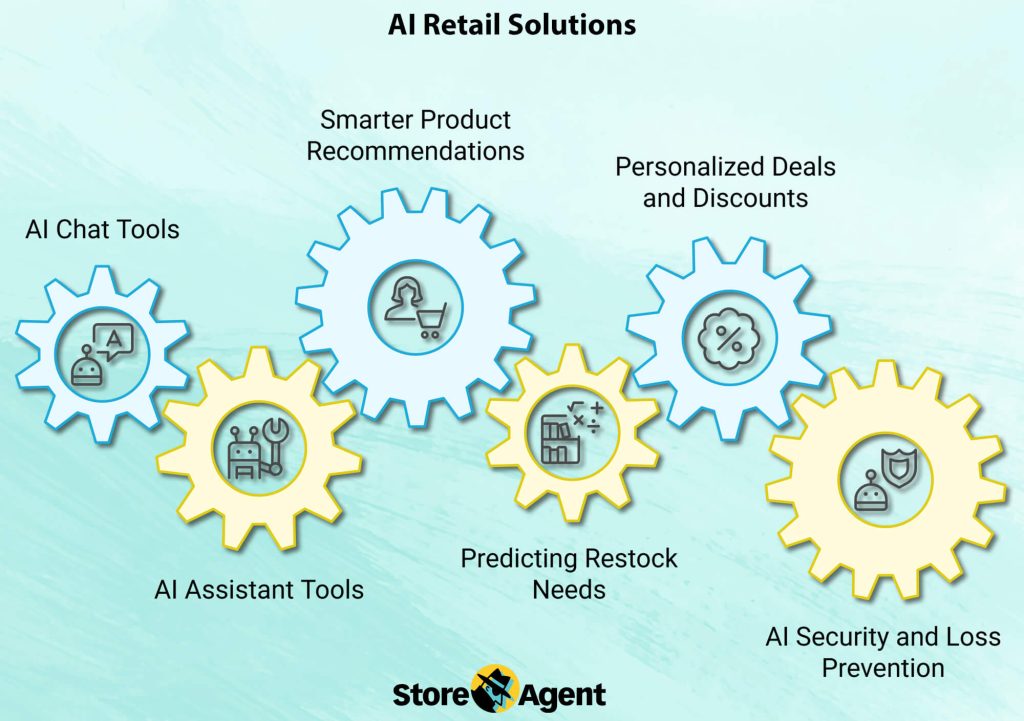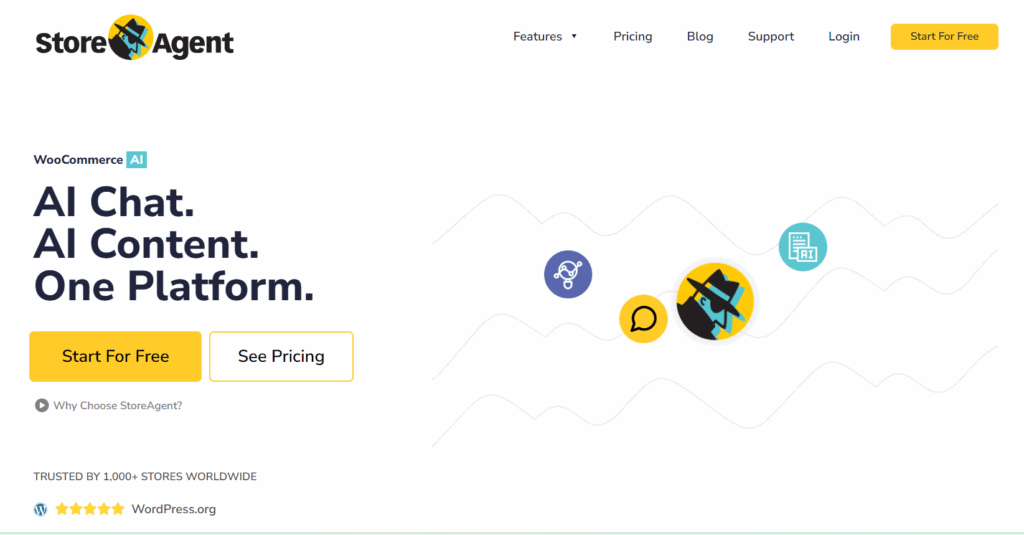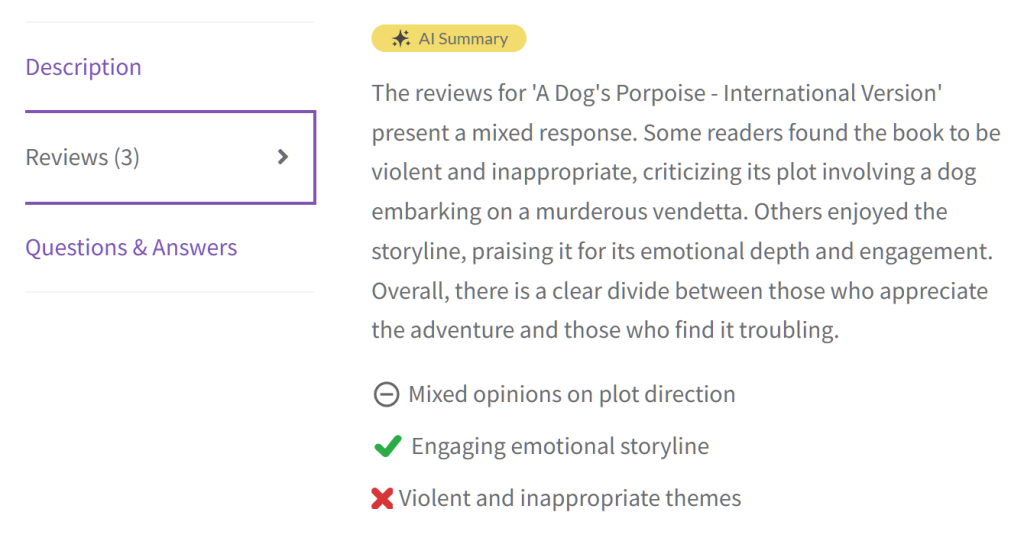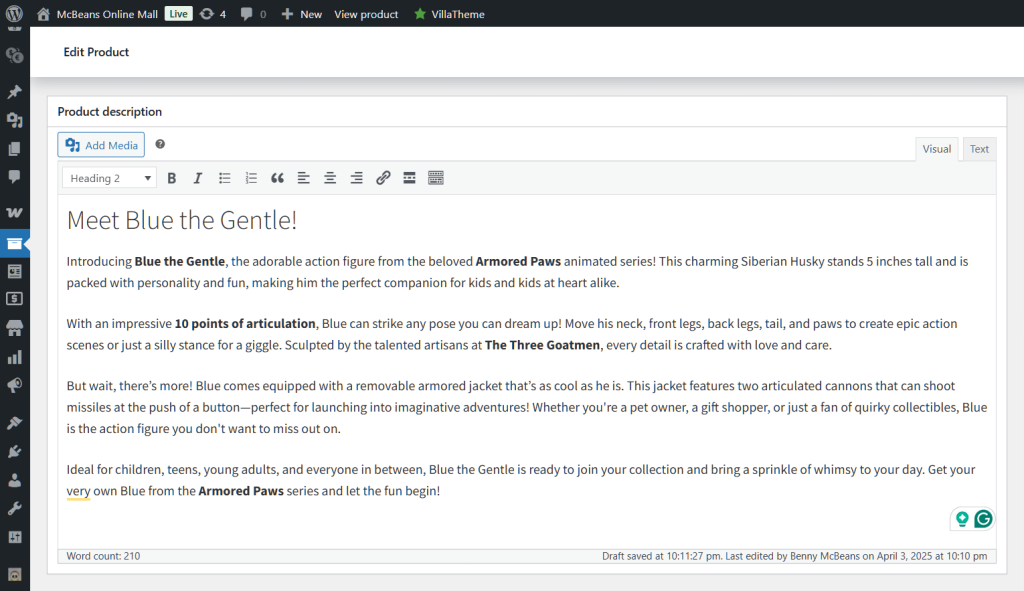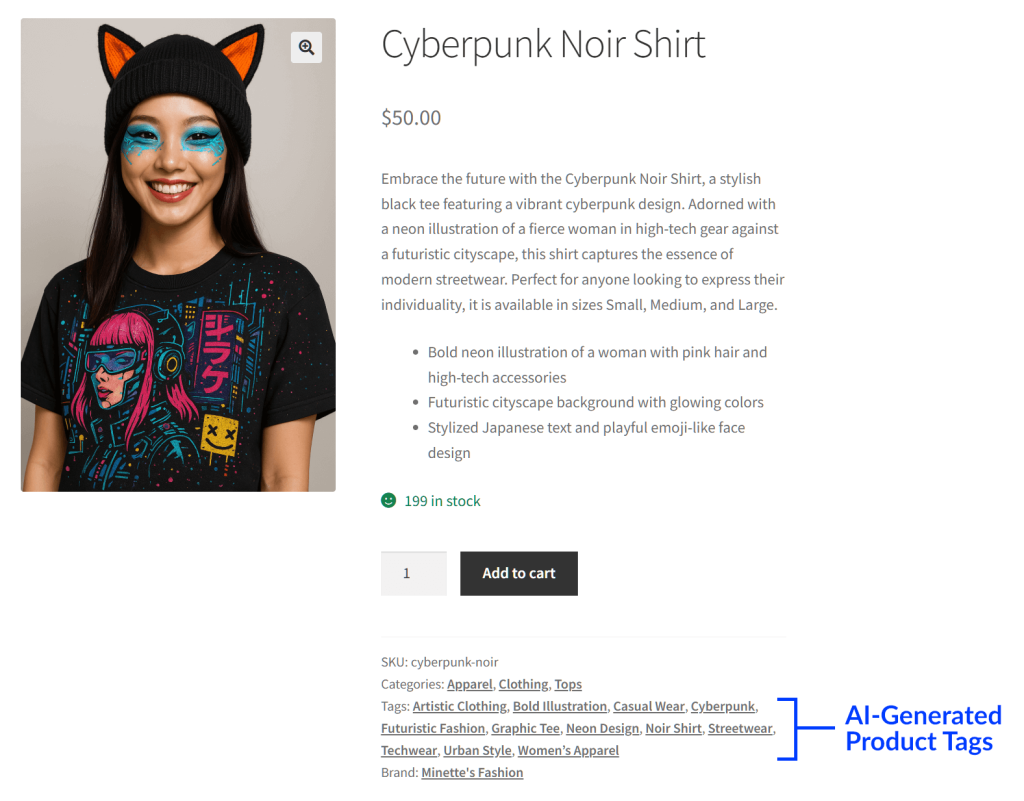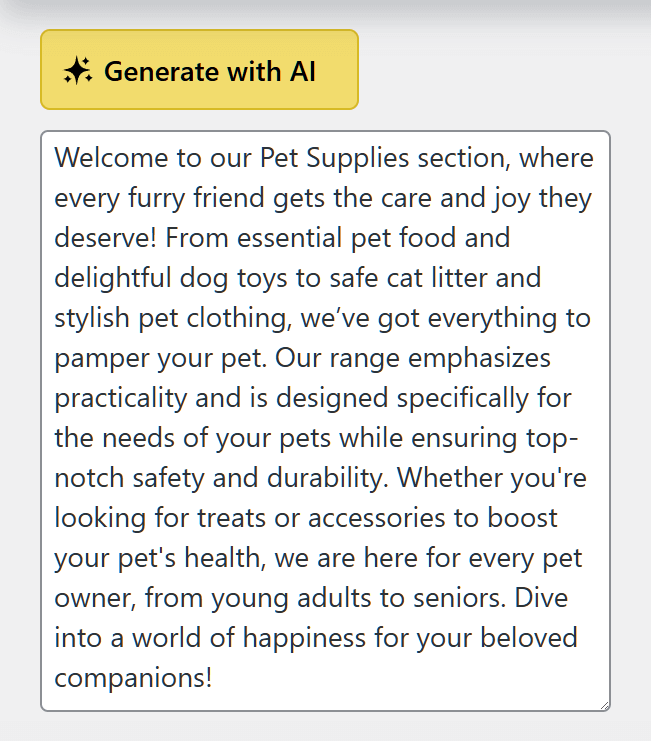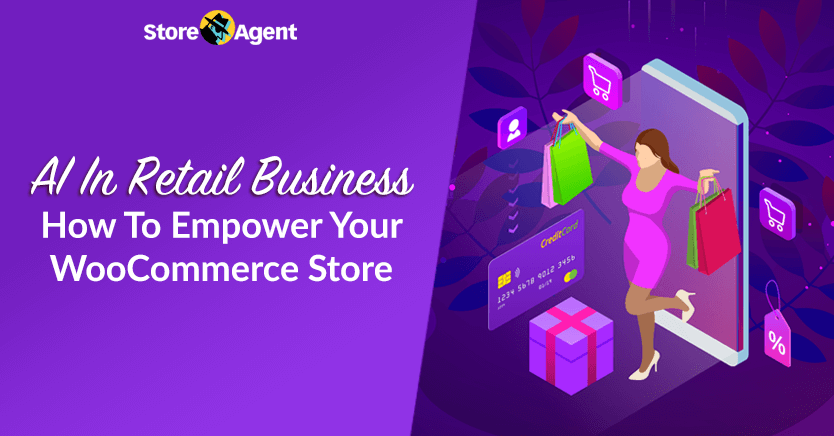
AI retail solutions are changing how stores work every single day. Tasks that used to take hours? They can now be done in minutes, if not seconds.
Not long ago, most stores relied on long hours of tedious work and speculation. Entire teams manually updated spreadsheets and tweaked listings across every sales channel. Others relied on guesswork, hoping their products would sell and that customers would return.
That’s not enough anymore. Today, stores are using AI to keep up and stay ahead, like switching from a paper map to GPS.
This guide will show how AI is being used in online stores. We’ll also explore an AI tool that helps WooCommerce store owners streamline and improve their store operations.
So let’s get right to it!
- I. How AI Is Changing The Retail World
- II. Real Examples Of AI In Retail Businesses
- 1. Amazon’s AI assistant and alerts upgrade online shopping
- 2. H&M's AI improves online inventory and personalizes shopping
- 3. Sephora’s Virtual Artist enhances makeup try-ons and color matching
- 4. Walmart’s AI boosts shopping and store efficiency
- 5. Zara’s AI refines online shopping and trend prediction
- III. Meet StoreAgent: AI Retail Solutions Built For WooCommerce
- Conclusion
- Frequently Asked Questions
- What applications can automate product content creation?
- How does an AI chatbot for customer service improve online shopping?
- What is the best product description generator for e-commerce?
- Why do people call StoreAgent Chat the best WordPress chatbot plugin?
- Where can I find top-rated AI content tools for online stores?
I. How AI Is Changing The Retail World
Managing a store used to be all routine and repetition. Owners spent hours on tiring tasks, guessing what customers wanted and hoping for the best.
Now, AI removes the uncertainty and cuts down the busywork. It learns from behavior and gives smarter answers over time.
With that in mind, here are some ways AI in retail businesses is shaking up ecommerce:
1. Helping store staff with AI chat tools
AI chat tools provide instant responses to customer questions, reducing wait times and freeing up staff to focus on more complex tasks. These tools can handle common inquiries, guide shoppers through product details, and even assist with order tracking all around the clock.
For one thing, store teams can work more efficiently. For another, customers get faster support, which improves their shopping experience and encourages more sales.
2. Supporting staff with AI assistant tools
Some AI retail solutions serve as assistants that handle various essential ecommerce tasks, such as summarizing customer reviews, writing product descriptions, analyzing product pages for errors, and more.
These assistants act like tireless coworkers, working quickly to help staff make smarter decisions and finish time-consuming jobs. Therefore, they can help reduce errors and improve overall store operations.
3. Smarter product recommendations
Certain AI retail solutions study customers’ buying habits and what they ignore to better understand their preferences. Then, instead of showing random items, they suggest products that truly match each shopper’s taste, kind of like a friendly store clerk who remembers your favorite snacks and knows just what you might like next.
This personalized approach helps customers find what they want faster and can boost sales for the store.
4. Predicting what to restock and when
Some AI retail solutions monitor sales patterns to see which products sell quickly and which ones remain on the shelves for too long. Analyzing this information enables them to help store owners plan their inventory better.
Such AI tools can predict when popular items will run low and suggest the right time to reorder them, preventing stockouts. At the same time, they warn against overordering slow-selling products, saving money and storage space. This smart forecasting keeps the store running smoothly and customers satisfied.
5. Personalized deals and discounts
Some shoppers care about deals on shoes, while others are hunting for snack bargains. The right AI retail solutions can tell the difference by looking at each person’s shopping habits. They then suggest discounts that match what the customer actually wants, making the deals feel personal and relevant.
These recommendations make customers happier. Furthermore, they increase the chance they’ll buy something.
6. AI security and loss prevention
AI systems can monitor stores in real time, spotting signs of theft, damage, or suspicious behavior as it happens. These tools often work with cameras and sensors to catch what the human eye might miss.
By alerting staff quickly, they help prevent loss, protect inventory, and create a safer shopping environment.
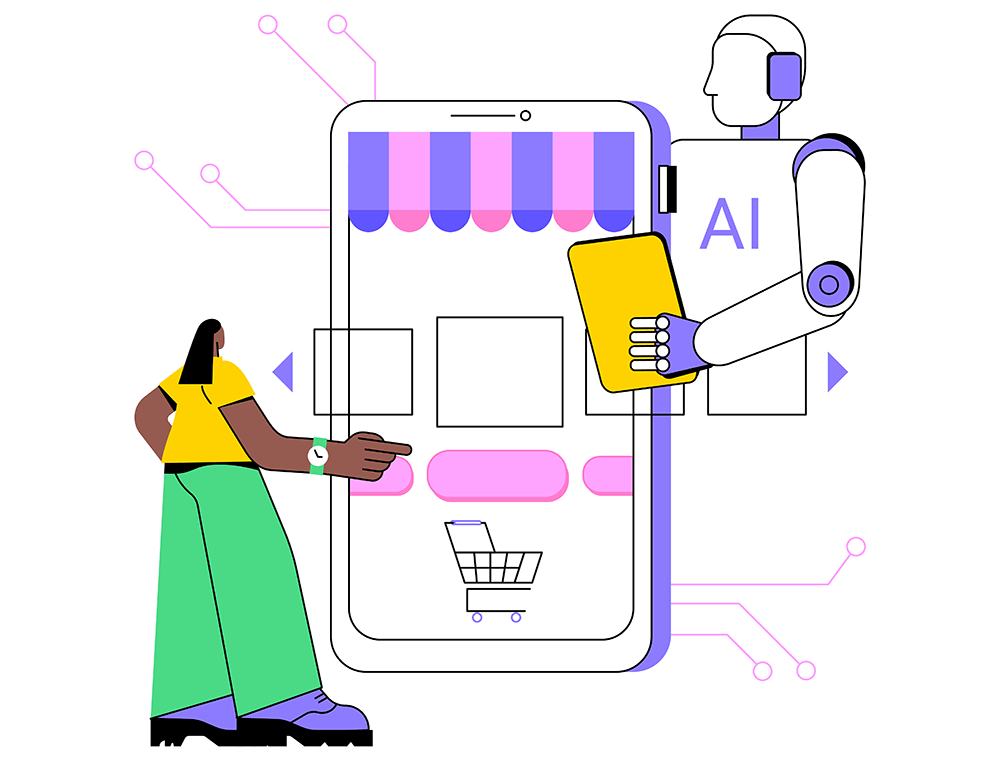
AI is changing retail from the inside out. It’s like giving a regular store a brain that keeps learning every day.
II. Real Examples Of AI In Retail Businesses
AI isn’t just a big idea. Online stores are using it in creative and smart ways:
1. Amazon’s AI assistant and alerts upgrade online shopping
Amazon uses AI to make online shopping faster and more personal. Its AI assistant, Rufus, helps customers find products and answers questions right on the site. This tool gives detailed suggestions and helps people decide what to buy more quickly.
Amazon also launched a feature called Interests. It lets shoppers set up alerts for products they care about. The AI scans Amazon’s inventory and notifies users when new items match their interests.
These tools show how Amazon uses AI to make online shopping smoother and more tailored to each person.
2. H&M’s AI improves online inventory and personalizes shopping
H&M uses AI to improve its online clothing selection. The system studies what customers buy and return, plus what people say on social media. This helps H&M figure out which styles to offer more often and which to stop selling.
AI also helps cut down on extra stock by matching supply with what shoppers want. It can even suggest clothes to customers based on their tastes.
These AI tools make online shopping easier and more personal, helping H&M keep customers happy while managing inventory better.
3. Sephora’s Virtual Artist enhances makeup try-ons and color matching
Sephora’s Virtual Artist app uses AI and augmented reality to help customers try on makeup virtually.
The app maps each user’s unique facial features using their smartphone camera, allowing them to sample over 1,000 shades of blush, bronzer, contour, and highlighter. Meanwhile, its AI-driven color match tool analyzes images to find and recommend Sephora products with similar shades, which users can then try on and buy directly in the app.
This technology makes makeup shopping more interactive and personal, boosting engagement on Sephora’s mobile platforms by letting customers experiment with looks before purchasing.
4. Walmart’s AI boosts shopping and store efficiency
Walmart uses generative AI to make online shopping easier and faster.
Customers can reorder items by voice or text, using AI to quickly add favorite products to their carts. An AI shopping assistant helps find the right products for occasions like parties, so shoppers don’t need to search endlessly.
Meanwhile, AI chatbots handle customer questions instantly, reducing wait times for support. Walmart also introduced a smart search tool that lets users look for products by describing events or needs instead of specific brands.
These AI tools simplify the online experience and help customers shop more efficiently.
5. Zara’s AI refines online shopping and trend prediction
Zara uses AI to improve the way people shop online and how its designers create new styles.
The company studies what customers search for, add to wishlists, and buy on its website. AI tools spot patterns in this data and suggest styles, colors, or fabrics that are getting popular. Designers then use this info to create clothing collections that better match customer preferences.
AI also helps show shoppers similar items they might like.
These changes make it easier to find what you want online, and help Zara stay fast and trendy in a competitive fashion market.
AI is showing up all over online retail. It’s like giving stores a smart assistant that works 24/7.
III. Meet StoreAgent: AI Retail Solutions Built For WooCommerce
Among the most useful AI retail solutions, StoreAgent is made to help WooCommerce stores use AI without the hassle. It works quietly in the background to make store owners’ lives easier.
Here are some ways StoreAgent can help WooCommerce store owners:
1. Turns reviews into short summaries
StoreAgent’s Review Summaries AI scans your WooCommerce product reviews and pulls out the key takeaways. Instead of showing every comment, it displays a short, clear summary right on the product page.
This AI highlights common themes (like what people love or mention most) so shoppers get the gist fast. This builds trust, helps customers decide quicker, and makes your reviews more useful without the clutter.
It’s review info made simple, smart, and easy to understand.
2. Writes quick product descriptions
StoreAgent’s Product Description Assistant writes clear, helpful product descriptions fast. It looks at your product details, reviews, and trends to create short blurbs that sound natural and fit your brand.
You don’t need to spend hours writing or worry about SEO; it adds keywords for you. It’s perfect for launching new products or updating old ones.
The result? Less work, better product pages, and more shoppers ready to click “buy.”
3. Delivers instant and reliable AI customer support
StoreAgent Chat brings AI customer support directly to your WooCommerce store. Instead of waiting for human replies, shoppers get instant, accurate answers from an AI chatbot for customer service that connects straight to your product catalog. From price and availability to variations and shipping, it ensures customers always have the right information when they need it.
It learns over time, remembers context for follow-up questions, and still gives you control through moderation and review options.
Want to know why StoreAgent Chat is considered the best WordPress chatbot plugin? It’s because it turns every product page into a reliable, conversion-ready experience that helps your store sell more while supporting customers better.
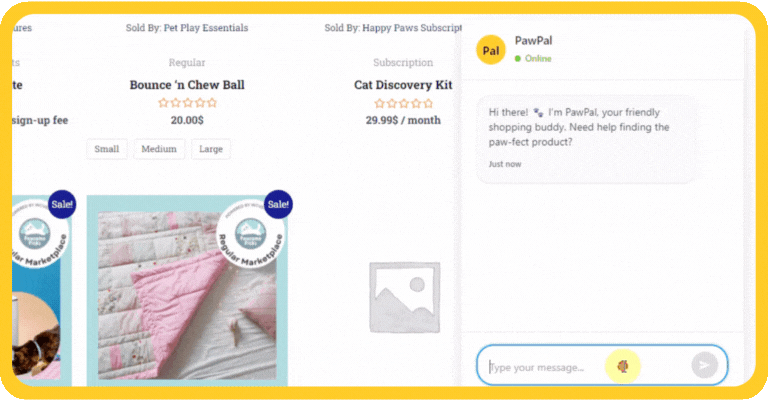
4. Generates product tags
Product Tag Generator AI automatically creates SEO-friendly tags for every product by analyzing descriptions and key details. This saves you hours of manual tagging while ensuring consistent, keyword-rich tags that improve search visibility and product organization.
Whether for your website or marketplaces, these optimized tags help customers find products faster and navigate your store with ease. It’s a simple way to make your store smarter and more efficient without extra effort.
5. Craft category descriptions
StoreAgent’s Category Descriptions AI writes clear, helpful summaries for your product categories so you don’t have to.
It looks at the types of products in each category, finds useful keywords, and turns that into a short description that makes sense to shoppers and search engines. This helps improve SEO, saves you time, and keeps your store looking polished and organized. Great for both new stores and growing ones!
Conclusion
AI in retail businesses is changing how stores operate, making tasks faster, smarter, and more personalized.
Big brands use it to improve shopping, while tools like StoreAgent bring those same AI benefits to WooCommerce stores. From writing content to answering questions, AI helps store owners save time, boost sales, and stay ahead.
In summary, this article discussed the following concepts:
- How AI is changing the retail world
- Real examples of AI in retail businesses
- StoreAgent: AI retail solutions built for WooCommerce
Curious about how to leverage AI retail solutions? Check out StoreAgent today to make managing your WooCommerce store easier and more effective!
Frequently Asked Questions
What applications can automate product content creation?
Several AI content tools can help automate tasks like writing product descriptions, summarizing reviews, or generating tags. For example, a product category description AI can create short, keyword-friendly blurbs for each category. Similarly, AI review summaries highlight the main points from customer feedback so shoppers don’t have to read hundreds of reviews. These tools are part of a growing set of top AI tools for sales optimization used by ecommerce stores today.
How does an AI chatbot for customer service improve online shopping?
An AI chatbot for customer service provides instant responses to common questions, like shipping times or product details, without needing a live agent. This form of AI customer support reduces repetitive tickets, shortens response times, and helps customers feel more confident about their purchase.
What is the best product description generator for e-commerce?
The best product description generator for e-commerce is one that creates clear, SEO-friendly descriptions while still sounding natural to shoppers. StoreAgent’s Product Description tool can analyze product specs, customer reviews, and trends to produce descriptions that are both informative and optimized for search engines. This saves time for store owners while ensuring product pages are ready to rank and convert.
Why do people call StoreAgent Chat the best WordPress chatbot plugin?
StoreAgent Chat is often referred to as the best WordPress chatbot plugin because it’s built specifically for WooCommerce stores. Unlike generic chatbots, it pulls details directly from your product catalog, meaning customers get accurate answers about stock, pricing, and features.
Where can I find top-rated AI content tools for online stores?
You can find top-rated AI content tools for online stores in curated reviews and comparison guides that cover solutions for product descriptions, reviews, and customer chat. Look for platforms that combine multiple features like AI review summaries, product category description AI, and automated workflows, so you don’t need to juggle multiple apps.
